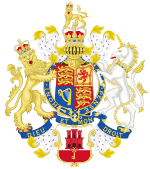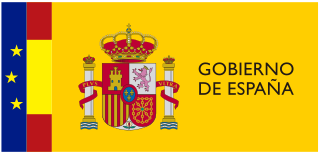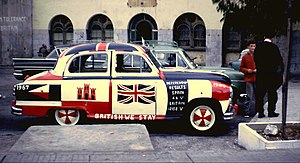The history of Gibraltar portrays how The Rock gained an importance and a reputation far exceeding its size, influencing and shaping the people who came to reside here over the centuries.

The politics of Gibraltar takes place within a framework of a parliamentary representative democratic British Overseas Territory, whereby the Monarch of the United Kingdom is the constitutional head of state represented by the Governor of Gibraltar. The Chief Minister of Gibraltar is the head of Government. As a British Overseas Territory, the Government of Gibraltar is not subordinate to the Government of the United Kingdom. The British Government, however, is responsible for defence and external affairs but Gibraltar has full internal self-government under its 2006 Constitution. Gibraltar is represented in the European Union, having been the only British Overseas Territory to have joined the European Economic Community under the British Treaty of Accession (1973).

Sir Joseph John Bossano KCMG is a Gibraltarian politician who served as Chief Minister of Gibraltar from 1988 to 1996 and Leader of the Gibraltar Socialist Labour Party from 1978 to 2011. He served as Leader of the Opposition from 1984 to 1988 and 1996 to 2011.

Gibraltar, a British Overseas Territory, located at the southern tip of the Iberian Peninsula, is the subject of an irredentist territorial claim by Spain. It was captured in 1704 during the War of the Spanish Succession (1701–1714). The Spanish Crown formally ceded the territory in perpetuity to the British Crown in 1713, under Article X of the Treaty of Utrecht. Spain later attempted to recapture the territory during the thirteenth siege (1727) and the Great Siege (1779–1783). British sovereignty over Gibraltar was confirmed in later treaties signed in Seville (1729) and the Treaty of Paris (1783).
Maurice Xiberras GMH was a Gibraltarian teacher, trade unionist and politician. He was regarded as being a strong defender of British sovereignty, who believed there was no future for Gibraltar without the continuing close relationship with the United Kingdom.

The Gibraltar Constitution Order 2006 was taken to a referendum in Gibraltar on 30 November 2006. A coalition of groups opposing the proposal held that a majority of 60% should be required to give effect to a new Constitution, quoting other instances, but the political parties held that the result should be decided by a simple majority in favour of the new constitution. The constitution was approved by 60% of the votes anyway.

A double referendum was held in Rhodesia on 20 June 1969, in which voters were asked whether they were in favour of or against a) the adoption of a republican form of government and b) the proposals for a new Constitution, as set out in a White paper and published in a Gazette Extraordinary on 21 May 1969. Both proposals were approved. The country was subsequently declared a republic on 2 March 1970.

Gibraltar is a juridically independent area in western Europe, and forms part of the Commonwealth of Nations as a British overseas territory.

The following outline is provided as an overview of and topical guide to Gibraltar:

The Gibraltar sovereignty referendum of 2002 was a referendum which was called by the Government of Gibraltar and was held on 7 November 2002 within the British overseas territory on a proposal by the UK Government to share sovereignty of the territory between Spain and the United Kingdom. The result was a rejection of the proposal by a landslide majority, with only just over one per cent of the electorate in favour.
The Memorandum by Her Majesty's Government on the Report of the Constitution Committee, or the Hattersley Memorandum for short, dated 26 June 1976, was the answer of the Labour British Government to proposed constitutional changes in Gibraltar ruling out the possibility of integration of Gibraltar with the United Kingdom.

The Southport Gates are three city gates in the British Overseas Territory of Gibraltar. They are located in the Charles V Wall, one of the 16th century fortifications of Gibraltar. The gates are clustered together, with the South Bastion to the west, and the Trafalgar Cemetery to the east. The first and second Southport Gates were constructed at present day Trafalgar Road in 1552 and 1883, respectively. The third gate, Referendum Gate, is the widest of the three and was constructed in 1967 at Main Street, immediately west of the first two gates. The Southport Gates are listed with the Gibraltar Heritage Trust.

Gibraltar is a British Overseas Territory located on the southern end of the Iberian Peninsula at the entrance of the Mediterranean Sea. During the early days of the British administration, Gibraltar was maintained primarily as a military outpost with limited attention paid to its role as a trading post. Initially long term settlement of Gibraltar was uncertain but as Spain's power waned it became established as an important base for the British Royal Navy. Throughout the 19th century there was conflict between the competing roles of military and trading posts, leading to tensions between the civilian population and the Governor of the day. Some Governors encouraged the development of the civilian role in government, whilst others regarded it as a nuisance. As a result, compared with other former British colonies, civilian Government in Gibraltar emerged largely in the 20th century as the needs of the civilian population were often considered by Governors as subordinate to the needs of the military. Since World War II, Gibraltarians have increasingly asserted their own individual identity. The Rock's relationship with Spain and the sovereignty dispute continues to affect the Politics of Gibraltar to this day.
The Lisbon Agreement was the first of a series of agreements between the British and Spanish governments intended to resolve their differences over Gibraltar.
The Brussels Agreement, 1984 was an agreement between the Governments of the United Kingdom and Spain concerning the territorial dispute over Gibraltar. The agreement was criticised by Gibraltar politicians for limiting the participation of Gibraltarians in determining their own future.

The Córdoba Agreement was an agreement between the Governments of Spain, the United Kingdom and Gibraltar to establish a Tripartite forum for co-operation on Gibraltar. It was signed by Spanish Foreign Minister Miguel Ángel Moratinos, UK Minister for Europe Geoff Hoon and Gibraltar's Chief Minister Peter Caruana. in Córdoba.

The effect of Brexit on Gibraltar concerns the status of Gibraltar after withdrawal of the United Kingdom from the European Union. The UK voted to leave the EU in the 2016 referendum and formally notified the EU of its intention to withdraw in March 2017. Gibraltar is not part of the UK but, as a British Overseas Territory, participated in the referendum and will, by default, cease to be a part of the EU upon the UK's withdrawal.
















